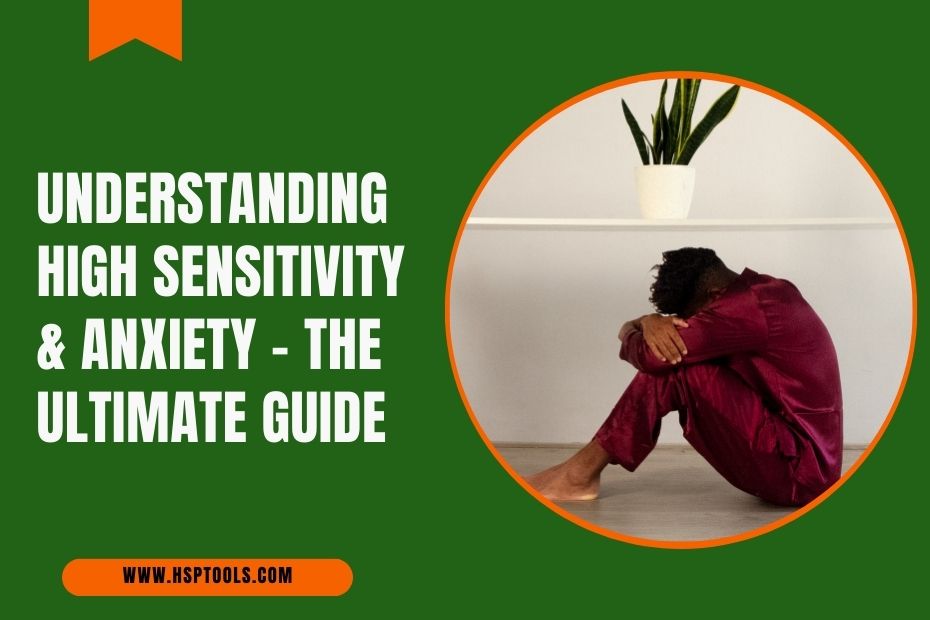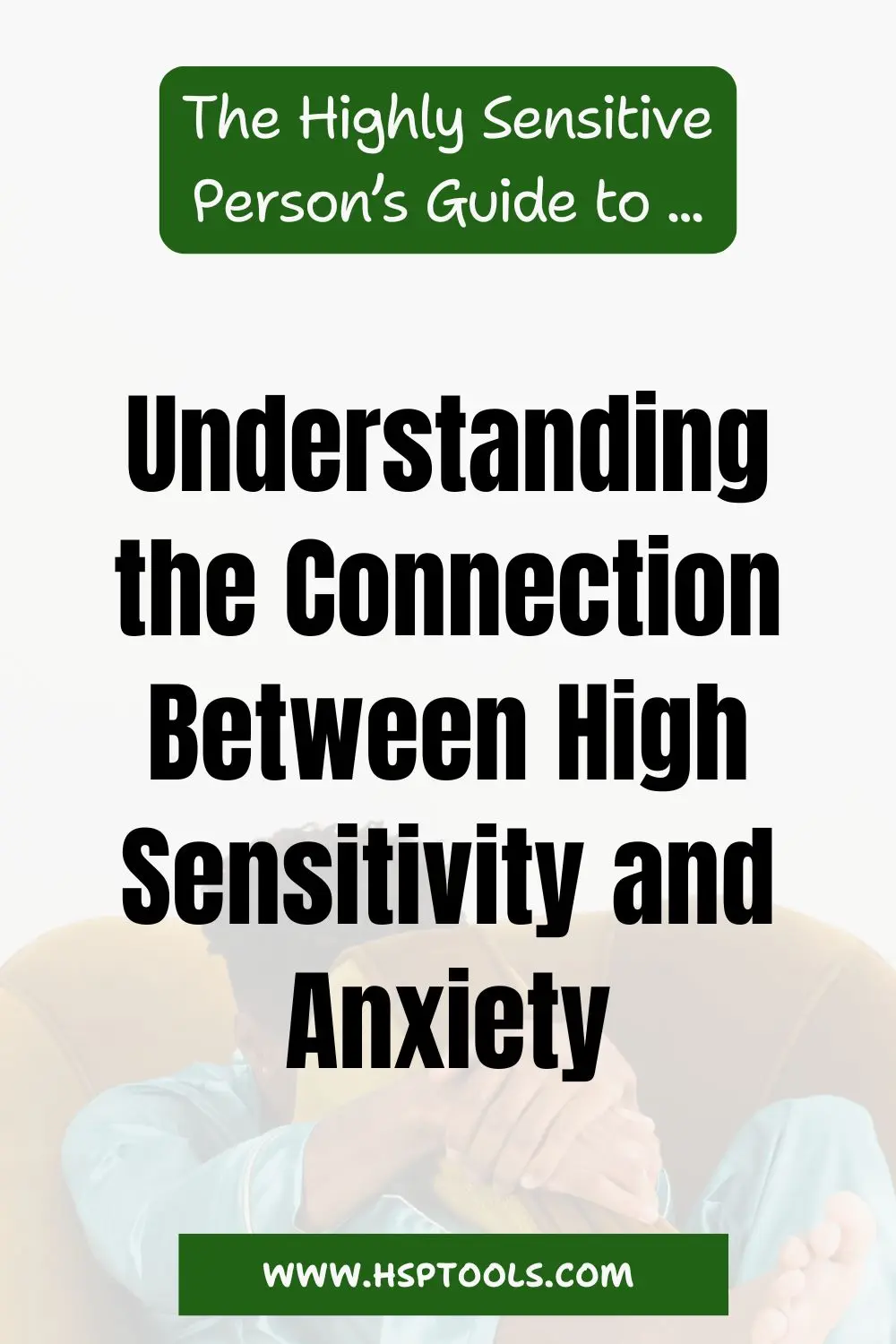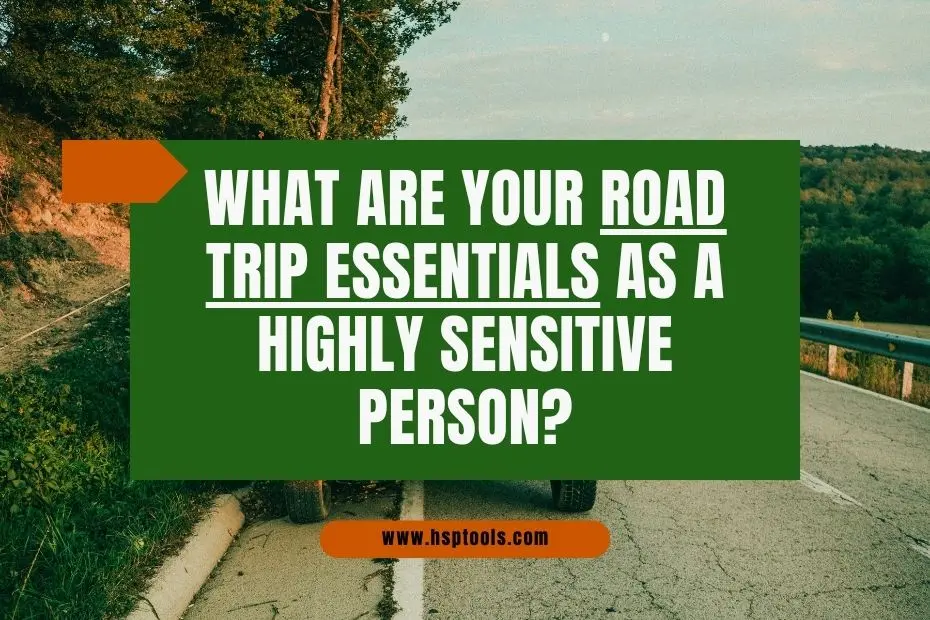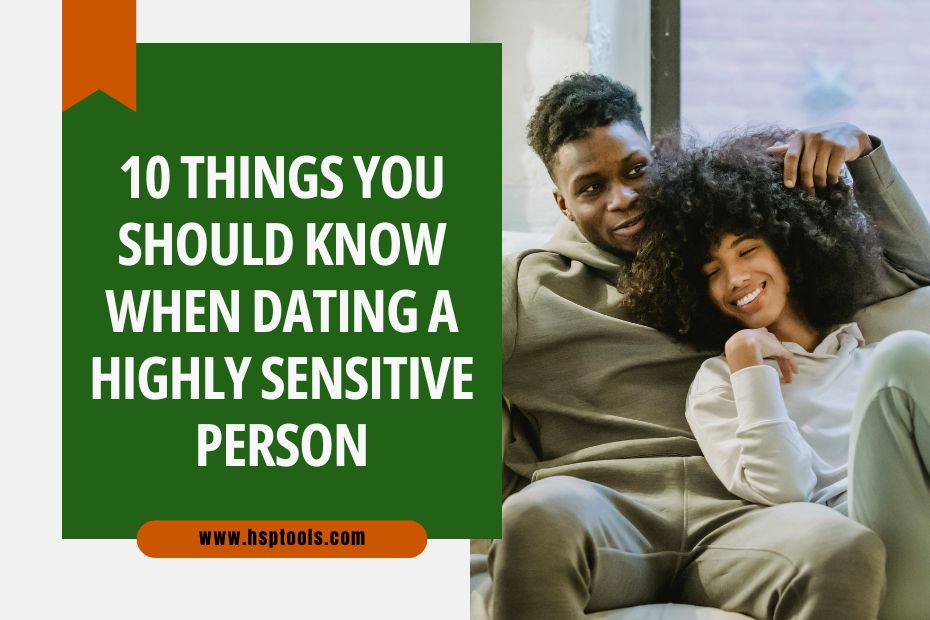Understanding the Link Between High Sensitivity and Anxiety: A Guide for Highly Sensitive People

As someone who identifies as a Highly Sensitive Person (HSP), you may have noticed that anxiety often feels like an unwelcome companion in your life.
Perhaps you’re wondering why you tend to feel more anxious than others or why certain situations overwhelm you more easily.
Understanding the connection between high sensitivity and anxiety can provide valuable insights into why you experience the world the way you do, and most importantly, how you can manage these feelings effectively.
This article explores why Highly Sensitive People (HSPs) are more prone to anxiety, drawing from scientific research on overstimulation and its effects on your nervous system.
It also dives into practical strategies for managing anxiety, including mindfulness techniques, therapy options, lifestyle adjustments, and other helpful tools to keep anxiety in check.

What Does It Mean to Be Highly Sensitive?
Before diving into the link between high sensitivity and anxiety, it’s important to understand what being an HSP truly means.
Highly Sensitive People, a term first introduced by psychologist Dr. Elaine Aron in the 1990s, are individuals with a finely tuned nervous system that responds intensely to internal and external stimuli.
About 20-30% of the population is believed to be highly sensitive, and this trait can manifest in various ways, such as:
- A heightened awareness of subtleties in your environment (e.g., sounds, smells, or textures)
- Strong emotional responses to events or experiences
- A deep sense of empathy toward others
- A tendency to feel overwhelmed by bright lights, loud noises, or chaotic environments
This heightened sensitivity to external and internal stimuli often leads to feelings of overstimulation, which can, in turn, increase the likelihood of developing anxiety.
So, let’s break down how high sensitivity and anxiety are interconnected.
The Overstimulation-Anxiety Cycle: Why HSPs Are More Prone to Anxiety
As an HSP, your nervous system is like a finely tuned antenna, picking up signals around you.
Whether it’s the energy of a crowded room, the subtle shift in someone’s tone of voice, or even the buzzing of a fluorescent light, you’re likely processing much more information than a non-HSP would.
While this ability can be a gift, it also comes with a cost: overstimulation.
1. Overstimulation as a Root Cause of Anxiety
Overstimulation occurs when you are bombarded with too many stimuli for your brain to process comfortably. This can lead to sensory overload, where everything feels too much, i.e. too loud, too bright, or too chaotic.
Research has shown that HSPs are more susceptible to sensory overload because of their deep processing of stimuli.
Dr. Elaine Aron, a pioneer in HSP research, explains that HSPs’ nervous systems are more reactive and reflective, meaning you spend more time analyzing and thinking about what you’ve observed. (Learn more on HSPerson.Com)
This deep processing can lead to mental and emotional fatigue, which makes you more vulnerable to anxiety.
When overstimulation occurs frequently, your body goes into a fight-or-flight mode, releasing stress hormones like cortisol and adrenaline. In the long term, this overstimulation can evolve into chronic anxiety.
The good news is that once you recognize how overstimulation triggers your anxiety, you can begin to implement strategies to manage it.
2. Sensory Processing Sensitivity and Anxiety
Sensory Processing Sensitivity (SPS) is the scientific term used in psychology to describe the trait of being highly sensitive. High Sensitivity is the simpler word for this trait.
According to a study published in Personality and Individual Differences, people with SPS are more prone to anxiety, especially in highly stimulating environments. (source)
The study found that HSPs have increased activity in brain regions related to awareness and empathy, contributing to their heightened emotional and sensory responses.
This amplified sensory processing means that situations that may seem neutral or even pleasant to others—like a busy café or an action-packed social event—can feel overwhelming and stressful for you.
Over time, the accumulation of these stressful experiences can lead to chronic anxiety if left unmanaged.

How to Manage Anxiety as an HSP – 5 Proven Ways
The fact that you’re more prone to anxiety doesn’t mean you have to accept it as a permanent fixture in your life. There are effective strategies to help you manage and reduce your anxiety.
Below are some evidence-based approaches tailored specifically for HSPs.
1. Mindfulness and Meditation
By practising mindfulness, you train your brain to focus on the present moment without judgment, which helps you reduce the impact of overstimulation.
Mindfulness has been shown to reduce anxiety in numerous studies. One study published in Clinical Psychology Review found that mindfulness-based interventions significantly decreased anxiety in individuals who practised regularly. (source)
Here’s how you can incorporate mindfulness into your daily routine:
Deep Breathing: Focus on slow, deep breaths, inhaling through your nose and exhaling through your mouth. Try to extend your exhale longer than your inhale to engage the parasympathetic nervous system, which calms the body.
Body Scan Meditation: Starting from your toes and moving up to your head, consciously relax each body part. This helps you tune into tension areas and release them, calming the mind.
Loving-Kindness Meditation: Focus on sending compassion to yourself and others. Repeat phrases like “May I be happy, may I be healthy, may I be free from suffering” to foster positive emotions and reduce stress.
Mindful Observation: Spend a few minutes observing something in your environment (e.g., a plant, the sky, or your surroundings). Focus fully on its details to create a peaceful distraction from anxious thoughts.
Walking Meditation: Take a slow, mindful walk, paying attention to the sensation of your feet on the ground, the movement of your body, and your breathing. This practice brings a calming rhythm to your body and mind.
2. Cognitive Behavioral Therapy (CBT)
If anxiety feels like a persistent issue in your life, seeking professional help through therapy can be incredibly beneficial.
Cognitive Behavioral Therapy (CBT) is one of the most effective treatments for anxiety, particularly for HSPs. It helps you reframe negative thought patterns and identify triggers that cause anxiety.
For example, an HSP may feel anxious about attending social events because they worry about becoming overstimulated. Through CBT, you can learn coping strategies to reduce that anxiety, such as practising grounding techniques or setting boundaries in social situations.
Here are five CBT strategies that work for Highly Sensitive People (HSPs)
Cognitive Restructuring: Identify negative thoughts and challenge their validity. For example, if you think, “I’ll embarrass myself at the party,” ask, “What’s the evidence for that?” and reframe it as: “I can enjoy myself and connect with others.”
Thought Journaling: Keep a journal to track anxious thoughts and your reactions to them. This can help you identify negative patterns and work on replacing them with more positive thoughts.
Exposure Therapy: Gradually expose yourself to anxiety-provoking situations in a controlled way. If social gatherings overwhelm you, start with small interactions and build up over time. This process helps to regulate your nervous system and reduce overstimulation.
Behavioural Activation: Engage in activities that bring joy and a sense of accomplishment, even when anxious. Doing things you enjoy can help break the cycle of avoidance and anxious thoughts.
Relaxation Training: Techniques like progressive muscle relaxation (PMR) can help control your body’s physical reaction to stress. By tensing and relaxing muscle groups, you can reduce the physical symptoms of anxiety.
3. Lifestyle Adjustments
Creating a lifestyle that supports your sensitivity is crucial in managing anxiety. By reducing sources of overstimulation, you can lower stress levels and improve your overall well-being.
Here are five key lifestyle changes you can implement:
Create Quiet Spaces: Designate areas in your home where you can retreat when feeling overstimulated. Use calming colours, soft lighting, and soundproofing to create a peaceful environment.
Time Management: Plan your day to include plenty of downtime. If you have a busy schedule, include quiet periods and rest between activities to allow for recovery from any stimulation.
Limit Caffeine and Sugar: Both caffeine and sugar can increase your sensitivity to stimuli and heighten anxiety. Switch to decaffeinated drinks or herbal teas, and opt for slow-releasing energy sources like whole grains and proteins.
Establish a Routine: Predictability can help reduce feelings of overwhelm. A regular daily routine can help conserve mental energy and reduce stress by allowing you to make fewer decisions.
Mindful Socializing: Choose your social engagements carefully and allow yourself the freedom to leave if you feel overwhelmed. Engage in smaller, quieter gatherings that allow for meaningful conversation rather than large, chaotic events.
4. Grounding Techniques
When you’re feeling anxious or overstimulated, grounding techniques can bring you back to the present moment and reduce the intensity of your anxiety.
They aim to help anchor you to the here and now, interrupting the anxious thoughts that tend to spiral out of control.
Some effective grounding techniques include:
The 5-4-3-2-1 Method: Ground yourself by identifying 5 things you see, 4 things you can touch, 3 things you hear, 2 things you smell, and 1 thing you can taste. This technique shifts your focus from internal anxiety to your external environment.
Cold Water Therapy: Splash cold water on your face or hold an ice cube. The sensation helps bring your mind back to the present moment and can even activate the vagus nerve, which calms the nervous system.
Visual Grounding: Focus on a specific object in the room and describe the details to yourself. What colour is it? What texture does it have? This exercise helps draw your mind away from anxious thoughts.
Tactile Objects: Keep a grounding object in your pocket; something like a smooth stone or piece of soft fabric. When you feel anxious, focus on the object’s texture, which can help soothe your mind.
Grounding Visualization: Imagine roots growing from your feet into the earth, stabilizing and grounding you. This form of visualization can be calming and reduce feelings of being overwhelmed.
5. Prioritize Self-Care
Self-care is essential for managing anxiety as an HSP.
By nurturing your mental, emotional, and physical well-being, you create a solid foundation for handling stress, which prevents overstimulation and helps you maintain a balanced state of mind.
Here are five self-care practices to consider:
Quality Sleep: Try to get at least 7–9 hours of sleep each night. Create a bedtime routine that includes winding down with calming activities like reading, meditation, or a warm bath to promote restful sleep.
Nourishing Diet: Eat a balanced diet with plenty of fruits, vegetables, lean proteins, and whole grains. Avoid processed foods and excess sugar, which can contribute to anxiety.
Regular Exercise: Exercise releases endorphins that help reduce anxiety and improve your mood. Choose forms of exercise that make you feel good and are not overstimulating, such as yoga, swimming, walking, or dancing.
Social Support: Sharing your experiences and getting emotional support from others can be incredibly grounding and relieving. Connect with supportive friends and loved ones who understand your sensitivity.
Creative Outlets: Engage in creative activities like painting, writing, or music. Creative expression allows you to process emotions and anxiety in a healthy and non-verbal way, giving you an emotional release without overstimulation.
Final Word on Understanding High Sensitivity and Anxiety
As a Highly Sensitive Person, your natural attunement to the world around you makes you more vulnerable to anxiety.
Understanding the link between high sensitivity and anxiety allows you to take proactive steps to manage it, such as incorporating mindfulness practices, seeking therapy, adjusting your lifestyle, and prioritizing self-care.
These five steps are great examples of how Highly Sensitive People (HSPs) can reduce overstimulation and live a more balanced and anxiety-free life.
Frequently Asked Questions (FAQs) About High Sensitivity and Anxiety
1. Are Highly Sensitive People more prone to anxiety than others?
Yes, research suggests that Highly Sensitive People (HSPs) are more likely to experience anxiety compared to the general population.
This is primarily due to their heightened sensitivity to external stimuli and the tendency to process information more deeply – two characteristics that result in HSPs becoming more susceptible to overstimulation, which often triggers anxiety.
However, not all HSPs experience chronic anxiety, and effective coping strategies can help manage it.
2. What’s the difference between high sensitivity and anxiety?
High sensitivity is a personality trait that describes how individuals respond to their environment. HSPs tend to be more attuned to sensory input, emotions, and subtleties that others might miss.
Anxiety, on the other hand, is a mental health condition characterized by excessive worry, nervousness, or fear.
While HSPs are more prone to anxiety due to their sensitivity, being highly sensitive does not automatically mean you will suffer from anxiety.
3. How can I tell if my anxiety is caused by my high sensitivity or something else?
If you often feel anxious in response to sensory overload—such as loud noises, bright lights, busy environments, or emotionally intense situations—it’s likely that your anxiety is related to your high sensitivity.
However, anxiety can also be triggered by factors unrelated to sensitivity, such as personal relationships, past trauma, or general stress. Working with a therapist or counsellor can help you identify the root cause of your anxiety and create a tailored plan for managing it.
4. Can overstimulation lead to panic attacks?
Yes, overstimulation can sometimes lead to panic attacks, especially for HSPs. When your nervous system becomes overwhelmed by too much sensory input, you might experience a surge of anxiety that leads to a panic attack.
Symptoms of a panic attack include rapid heart rate, shortness of breath, dizziness, and feelings of impending doom.
To prevent panic attacks, it’s important to recognize early signs of overstimulation and take steps to reduce sensory input or practice grounding techniques.
5. Is it possible to reduce my sensitivity, or do I just have to live with it?
High sensitivity is a natural trait and isn’t something that can or should be “fixed.” However, you don’t have to feel overwhelmed by it.
While you can’t reduce your sensitivity, you can learn to manage it effectively by implementing coping strategies like mindfulness, grounding techniques, and lifestyle adjustments.Over time, these practices will help you navigate your sensitivity with greater ease and reduce the anxiety that often accompanies overstimulation.
6. Can medication help with anxiety in Highly Sensitive People?
Medication can be an option for managing anxiety in some HSPs, particularly if anxiety is severe or persistent. Selective serotonin reuptake inhibitors (SSRIs), for example, are commonly prescribed for anxiety disorders and can help regulate mood.
However, medication should be considered in conjunction with other approaches, like therapy and lifestyle changes. Always consult with a healthcare provider to determine the best course of action for your specific situation.
7. Can HSPs use their sensitivity as a strength in managing anxiety?
Absolutely! While high sensitivity can sometimes feel like a challenge, it also comes with strengths that can be beneficial in managing anxiety.
HSPs tend to be introspective, empathetic, and deeply connected to their emotions, making them more receptive to therapies like mindfulness and cognitive behavioural therapy (CBT).
Additionally, the ability to notice subtle changes in their environment or body means that HSPs can often recognize signs of anxiety early and take steps to address it before it escalates.
8. What are some quick ways to reduce anxiety when I feel overstimulated?
When you feel overstimulated, try these quick anxiety-reduction techniques:
Step outside for fresh air: A change in environment, especially in nature, can immediately reduce sensory input and help calm your nervous system.
Engage in deep breathing: Practice slow and deep breaths to calm your body’s fight-or-flight response. Focus on elongating your exhales to activate your parasympathetic nervous system.
Find a quiet, comfortable space: Removing yourself from noisy, chaotic environments can give you a break from overwhelming stimuli.
Use grounding techniques: Try the 5-4-3-2-1 method to bring your focus back to your physical surroundings and out of anxious thoughts.
Listen to soothing music or nature sounds: Calming sounds can help shift your focus and create a more peaceful atmosphere.9. Can therapy really help me manage both high sensitivity and anxiety?
Yes, therapy can be incredibly effective for managing both high sensitivity and anxiety.
Therapies like Cognitive Behavioral Therapy (CBT) can help you identify and replace negative thought patterns with healthier ones, and teach you practical coping skills.
Other approaches like Acceptance and Commitment Therapy (ACT) and mindfulness-based therapies are well-suited for HSPs because they focus on self-awareness and emotional regulation.Working with a therapist who understands the HSP trait can provide personalized strategies to help you navigate both your sensitivity and anxiety.
10. What should I do if I feel overwhelmed in a social situation?
If you find yourself feeling overstimulated in a social situation, try the following steps to regain control:
Step away from the situation: Excuse yourself and go to a quiet space, such as a bathroom or outside, where you can regroup.
Practice deep breathing: Focus on slow, deep breaths to calm your body and mind.
Use grounding techniques: Engage with your senses to return to the present moment. Focus on an object in the room or the sensation of your feet on the floor.
Limit your exposure: Don’t be afraid to leave early or set boundaries around how long you’ll stay in highly stimulating environments.
Have an exit strategy: If social situations often overwhelm you, always plan how you will leave or take breaks. Knowing you have a way out can help reduce anxiety.








